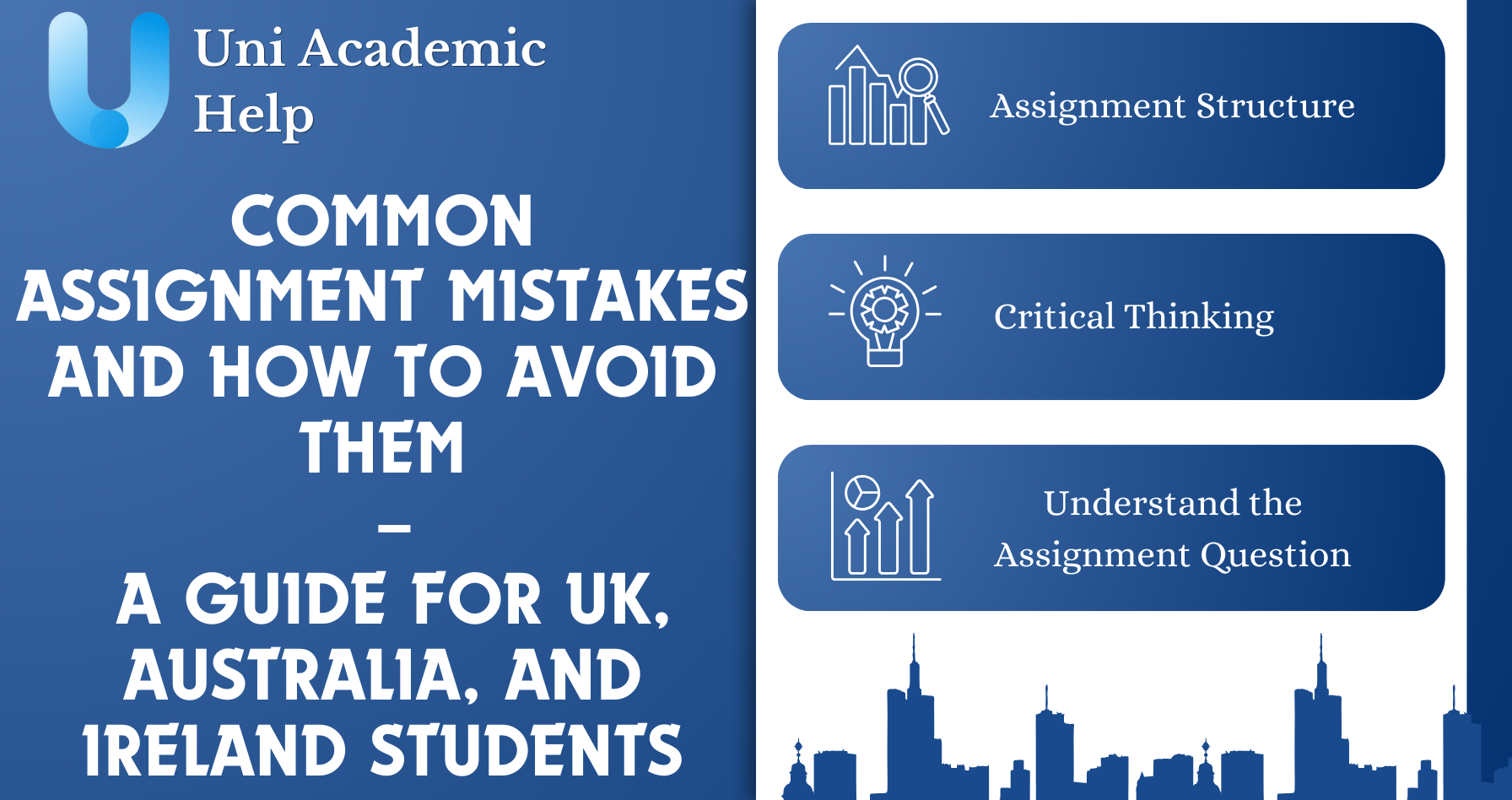Common Assignment Mistakes and How to Avoid Them
Assignments are a crucial part of university education, but many students make errors that affect their grades. Whether you're studying in the UK, Australia, or Ireland, avoiding common mistakes can improve the quality of your assignments and boost your academic success.
In this guide, we will discuss the most frequent assignment mistakes students make and practical strategies to avoid them.
1. Poor Understanding of the Assignment Question
The Mistake:
Many students misinterpret the assignment question or fail to read the instructions carefully. This leads to writing off-topic content, incorrect answers, or missing key requirements.
How to Avoid It:
Break down the question – Identify key terms such as analyze, discuss, compare, evaluate, etc.
Ask for clarification – If in doubt, consult your professor or lecturer.
Read the marking criteria – Understanding how your work will be assessed helps in aligning your content correctly.
2. Weak Assignment Structure
The Mistake:
A disorganized structure makes your assignment hard to follow. Common structural issues include:
Lack of a clear introduction, body, and conclusion.
Ideas that jump around instead of following a logical flow.
Paragraphs that are too long or too short.
How to Avoid It:
Plan before writing – Create an outline with main headings and subpoints.
Follow a logical sequence – Each paragraph should link to the next smoothly.
Use topic sentences – Start each paragraph with a clear main idea.
3. Insufficient Research and Weak Arguments
The Mistake:
Many students rely on limited sources or personal opinions rather than well-researched evidence. This weakens the credibility of their arguments.
How to Avoid It:
Use academic sources such as journals, books, and university databases.
Support every claim with evidence, statistics, or expert opinions.
Compare different viewpoints before concluding.
4. Plagiarism and Poor Referencing
The Mistake:
Directly copying text from sources without citation.
Paraphrasing without crediting the original author.
Incorrect referencing format (Harvard, APA, MLA, etc.).
How to Avoid It:
Always cite your sources correctly based on your university’s guidelines.
Use plagiarism detection tools like Turnitin or Grammarly before submission.
Learn proper paraphrasing techniques – express ideas in your own words while referencing the source.
5. Poor Time Management and Last-Minute Work
The Mistake:
Many students procrastinate and rush their assignments close to the deadline, leading to errors, poor research, and lack of depth.
How to Avoid It:
Start early and set a study schedule.
Break the assignment into smaller tasks with deadlines.
Allocate time for editing and proofreading before submission.
6. Lack of Critical Thinking
The Mistake:
Simply summarizing information without analyzing it.
Not questioning or evaluating different perspectives.
Writing in a descriptive rather than analytical manner.
How to Avoid It:
Compare and contrast different theories or viewpoints.
Provide evidence-based analysis rather than just stating facts.
Develop a strong argument with supporting examples.
7. Overuse of Informal Language and Poor Academic Tone
The Mistake:
Using slang, contractions, or conversational tone in academic writing.
Writing in first-person perspective unless allowed.
Not maintaining a professional and formal style.
How to Avoid It:
Use formal, academic language suitable for university assignments.
Avoid I, me, we, and you unless the assignment requires personal reflection.
Use objective and neutral phrasing.
8. Ignoring Formatting Guidelines
The Mistake:
Different universities in the UK, Australia, and Ireland have specific formatting rules, and ignoring them can lead to lower grades. Common issues include:
Incorrect font size and spacing.
Missing cover pages or headers.
Not following word count requirements.
How to Avoid It:
Carefully read the assignment guidelines before starting.
Use the correct font (Times New Roman, Arial, Calibri – Size 12) and double-spacing.
Keep your word count within the required limit (avoid under- or over-writing).
9. Submitting Without Proofreading
The Mistake:
Submitting an assignment full of spelling, grammar, and punctuation errors can lower your marks significantly.
How to Avoid It:
Proofread multiple times before submission.
Use tools like Grammarly, Hemingway Editor, or Microsoft Word spell check.
Read your assignment out loud to spot awkward sentences.
10. Failing to Follow Lecturer Feedback
The Mistake:
Some students ignore feedback from previous assignments, leading to repeated mistakes.
How to Avoid It:
Carefully read the comments and feedback from your lecturers.
Make notes on recurring issues and work on improving them.
Apply feedback to future assignments to show progress.
Final Thoughts
Avoiding these common assignment mistakes can greatly improve your academic performance. By understanding the assignment, managing time well, researching properly, and proofreading carefully, students in the UK, Australia, and Ireland can submit high-quality work and achieve better grades.
At UAH (Uni Academic Help), we provide expert guidance and assignment support to help you excel in your studies. Need professional assistance? Contact us today!




.png)
.png)
